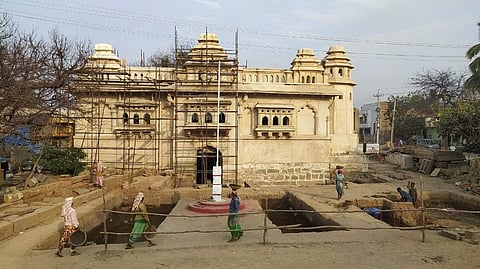

Flip through the History textbooks in our schools and it is largely dominated by the kingdoms that ruled in the Northern Part of India, especially in Delhi or Agra. But what about the rulers or kingdoms that ruled the Southern or Deccan region in India. That's where the Deccan Heritage Foundation (DHF), founded by Dr George Michell and Helen Philon, two scholars on Deccan Art and Architecture, plays an important role. Having started this NGO in 2011, they have been working extensively on the field and with various departments in the government to restore, conserve, study and educate the common man about the history of the Deccan region.
Srikara, who works as an administrator at the Deccan Heritage Foundation in Bengaluru explains, "Like the Taj Mahal or Qutub Minar which are magnificent monuments in North India, there are equally beautiful or magnificent monuments in South India. Badami, Aihole, Pattadakal, Gol Gumbaz in Vijayapura and the Golconda Fort in Hyderabad are absolute wonders of architecture that will leave us in shock and surprise."
The organisation focuses on three different factors - conservation, publication and education. DHF is currently working on the conservation projects in Bidar, Hyderabad and Hampi. Srikara explains how they're working, "In Bidar, we found that there is an underground water supply system used from the 14th to the 16th century called Karez. Essentially, it is a Persian engineering system introduced in India when the Bahamanis were ruling the Deccan Plateau region. The Karez is a 2 km long underground water tunnel which starts with a huge well called the Mother well. The water flows through it and along the length of this tunnel and there are wells at regular distances. This would help people draw water from the tunnel through these wells."
And how do they make it work? Srikara continues, "What we did was we joined hands with the municipal body and a few other NGOs to process the desilting and removing the debris stuck in the old tunnel. Clearly, networking has been key."
Besides this, the DHF has published 13 different guidebooks that can really tell you loads about historical places. "These books can help tourists visiting the historical monuments. We have also published books authored by scholars who have studied architecture and history in the Deccan region for many years. These books are rich in photography and can serve as a source of information to research scholars and even college lecturers or students," explains Srikara.
In terms of education, DHF has conducted study tours to different historical places for school children until last year. Besides this they have also conducted sessions on various important chapters in History. What makes the organisation unique is that they have conducted a short course on the History of Indian Architecture. Srikara explains, "This course was specially designed by Conservation Architect Saparya Varma. The first class was conducted at the The Brindavan Trust and was dedicated to the education of children with learning disabilities such as Dyslexia, ADHD, High Functioning Autism Spectrum Disorder and more. While we wanted to continue with this course and take it to different educational institutions and centres, the pandemic hit us."
When we asked if they have been functioning on the field even during this pandemic, Srikara says, "Yes, we have been functioning physically in the Karez region in Bidar as waste management is considered to be one of the essentials. However, the work is a bit slow when compared to the regular days before the pandemic. At the same time, we are organising webinars with people like William Dalrymple who is a famous author, Evrim Binbas, University of Bonn, Subhashini Kaligotla, Yale University and many others. These webinars are open to the people of any age group. All they have to do is register themselves through our website and they will get access to watch these webinars live or even watch on our YouTube channel once they are published."
To study the history of the Deccan region, visit deccanheritagefoundation.uk
